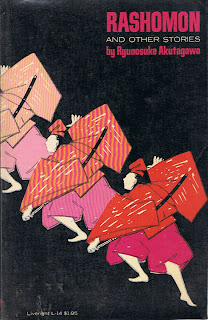Asian book #1 of Diversity Challenge
My first encounter with Ryunosuke Akutagawa was back in freshman English, in my Intro to Fiction Class, when we read “In a Grove.”
I remember we had small group discussions about it, and I couldn’t concentrate because this guy I was crushing on was sitting next to me (tee hee hee) but I remember someone saying that the story was the same as the Japanese film Rashomon by Akira Kurosawa (The film was based largely on In a Grove, incorporating some elements from the short story Rashomon).
I still haven’t seen the movie, but I chanced upon this Akutagawa anthology at Book Sale and it was a 1970 edition (Liveright paperback) with some notes pencilled in the margins, but it was about P40, and I knew I wouldn’t come across it again. (I googled the name pencilled in the inside cover and apparently she’s an American minister of some religious congregation… Oh, in case you’re wondering, I started doing that sort of thing — googling the names inside old books– after watching Whisper of the Heart, hee hee hee).
Ryunosuke Akutagawa was a writer in the modern period (early 20th century) who was disturbed by Japan’s industrialization, and writing was his way of response, with over a hundred works to his name, before committing suicide at the age of 35.
The book contains six medieval Japanese short stories: In a Grove, Rashomon, Yam Gruel, The Martyr, Kesa and Morito, and The Dragon, a varied collection dealing with different aspects of societal values and human psychology. Authentic illustratiions (by M. Kuwata) are interspersed throughout the text.
 In a Grove is easily the frontispiece to this collection — it is a tale of crime (rape, murder and suicide) told from five different perspectives. I like the story’s philosophical exploration into the nature of truth — how it is impossible to know the absolute truth, and how easy it is to blur the lines with memory, human desires and motivations, and personal biases.
In a Grove is easily the frontispiece to this collection — it is a tale of crime (rape, murder and suicide) told from five different perspectives. I like the story’s philosophical exploration into the nature of truth — how it is impossible to know the absolute truth, and how easy it is to blur the lines with memory, human desires and motivations, and personal biases.The next story features the Rashomon, the largest gate marking entry into Japan’s ancient capital, Kyoto. The gate crumbled with the decline of Kyoto, and the Rashomon soon became a nest for thieves and criminals, as well as a place to dump unclaimed corpses. A recently laid off servant vwitnesses an old hag stealing hair from corpses to make a wig, and the encounter changes his life.
Yam Gruel features a bumbling protagonist whose greatest ambition was to eat his fill of this aristocratic delicacy. When he is presented with an opportunity to fulfill his ambition, however, things do not go the way he imagined.
The Martyr was a surprise because of its Christian (and Jesuit, at that) roots – apparently Akutagawa liked dramatizing existing texts and events, and this one was based on volume two of the book Legenda Aurea. This is the story I least enjoyed — probably because it was less subtle in the moralistic aspect.
Kesa and Morito, I read somewhere, was based on a real affair. Kesa and Morito are illicit lovers, and Morito is driven to kill Kesa’s husband. Here’s the quandary — he doesn’t hate the man and he doesn’t love Kesa but he feels Kesa is compelling him to do it. Kesa doesn’t love Morito either, but is fascinated because Morito mirrors the ugliness she sees in herself. Out of guilt, Kesa switches with her husband on the night Morito comes to kill him. It’s also fascinating how the story tests the very thin line between love and hate.
The Dragon is more of a folk tale, like something out of JK Rowling’s Tales of Beedle the Bard. It was also lighter and more humorous than the rest, dealing with a fellow with a big nose who got so tired of being teased about it that he pulls the prank of the century!
I do not read many anthologies because I like meaty novels I can sink my teeth into, but I enjoyed this book, because while the stories offer a moralistic viewpoint, they pose philosophical questions that encourage the reader to ponder the situations presented and reassess his or her own values.
***
my copy: Liveright paperbound edition, 1970
my copy: Liveright paperbound edition, 1970
my rating: 5/5 stars
Photo courtesy of: http://www.redvicmoviehouse.com/images/poster/rashomon.jpg (poster)


One thought on “Rashomon and Other Stories by Ryunosuke Akutagawa”